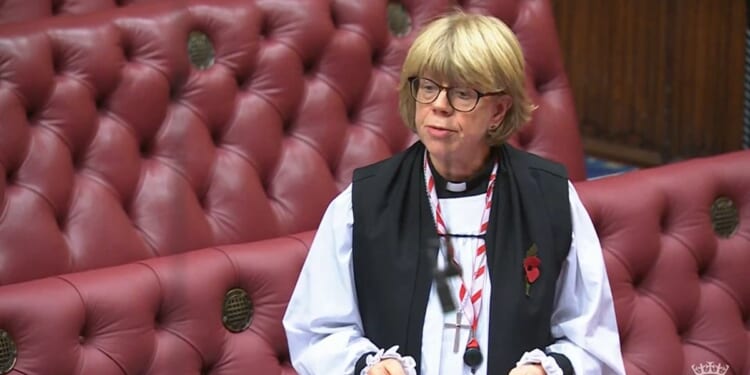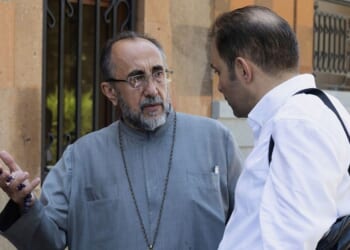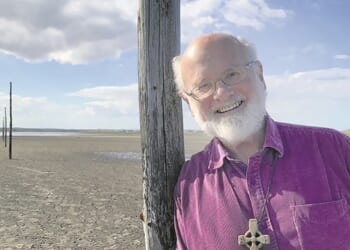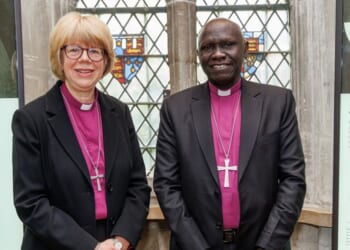CONVERTING to Christianity is “not like flicking a switch” but a gradual, often costly process that should not be held against asylum-seekers, the Bishop of London, the Rt Revd Sarah Mullally, has said.
The Archbishop-designate was speaking during a debate on the Border Security, Asylum and Immigration Bill, which completed its Report Stage in the House of Lords on Tuesday. She was opposing an amendment from Baroness Maclean of Redditch which would require an annual report on how many asylum-seekers were granted asylum based on their religion or religious conversion.
This was, the Baroness said, based largely on conversations with the Revd Matthew Firth — a former Priest-in-Charge of St Cuthbert’s, Darlington, who left to join the Free Church of England in 2020 — who made claims that the Church was complicit in a “conveyor belt” of asylum-seeker conversions (News, 16 February 2024).
Bishop Mullally said that the amendment was “motivated by a desire to make an issue of something that is not an issue”; and, if passed, this would be a “concerning threat” to freedom of belief in the UK. The Select Committee had found no evidence of Mr Firth’s claims abuse of the system (News, 15 March 2024).
The data could not be easily extracted, she said. “There are many more problems to be solved in our asylum system before addressing this data point.”
Bishop Mullally continued: “I imagine that there are some asylum-seekers who might well believe that converting to Christianity will help their asylum claim. One can hardly be surprised about that, when some politicians keep implying that that is the case.”
But “clergy are not naïve,” and had been trained to discern “through teaching, discussion, reflection, observation and prayer, whether a person, whoever they are, is ready for a public confession of faith through baptism. . . It is not the job of clergy to assess asylum claims. The Home Office has stated that evidence from clergy or church members in an asylum case does not determine the outcome of a claim.”
Without the support of Lord Hanson, the Minister of State for the Home Office, the amendment was not moved.
Earlier in the day, the Bishop of Chelmsford, Dr Guli Francis-Dehqani, had attempted to amend the “good character” clause in the Bill, which was changed by the Government through retrospective secondary legislation so that the method used by a migrant to reach to the UK, even if they did so as a child, was included as part of their character assessment.
“This”, Dr Francis-Dehqani argued, “is a fundamental cultural shift and introduces a factor that bears no correlation to someone’s moral character, their worth and value or the contribution they might make to British society.”
The determining factor, she said, should instead be “the reason behind their travel in pursuit of sanctuary” — and this is what her amendment would achieve.
She told peers: “This new clause would ensure the good character requirement is not applied contrary to the UK’s international legal obligations across a number of instruments. It also ensures that an assessment of good character may not take into account a person’s irregular entry or arrival to the UK if they were a child, and it may only be taken into account to the extent specified in guidance published and in force at the time of an adult’s irregular entry or arrival.”
Many asylum-seekers had few, if any, options to apply for asylum before making a journey, she said. She asked the Minister whether the Government could provide pre-authorised travel routes to avoid illegal journeys.
During the Committee stage of the Bill, the Minister had, Dr Francis-Dehqani said, made it clear that citizenship should not be afforded to those who have broken the rules and entered illegally. “But I respectfully argue that the refugee convention makes it clear that it is not illegal to travel to claim asylum; hence, the state rightfully considers the merits of each claim.
“Why, then, should a legal act, forced upon many in the most desperate of circumstances, be used as a future test of their character and prevent them from ever truly becoming a full member of British society? It is not just too high a bar but an unattainable and, I suggest, an immoral one.”
The guidance should also be specific in ensuring that the rules did not apply to children, she said. “Given that illegal entry is normally considered to be outside a child’s control, most applicants would not be held accountable for immigration breaches that occurred when they were a minor.”
Speaking personally about her vocation, having arrived in the UK as an asylum-seeker when she was 14, she said: “Without British citizenship, this journey would not have been possible — indeed, I would not be standing before noble Lords today. If citizenship is to be seen as a privilege, not a right, then surely it is a gift that we should not close off for refugees merely on the basis of how they travelled here. Let us not forget that we are talking about people who have an established and legal right to remain in this country.”
The former Archbishop of York Lord Sentamu said that he was persuaded by these arguments. Also speaking from personal experience, he said that he had arrived in the UK “extremely angry” in 1974, having suffered internal bleeding “from the blows received from Amin’s soldiers” (the former President of Uganda, Idi Amin).
He continued: “This whole question of good character can be very subjective and misleading when the person first arrives, particularly when they come as children. We all have the grace and ability to grow out of some of the not-so-good bits of us, but we still remain a very rough diamond. We are never fully polished until we go through the gate of death.”
Legislation based on good character did not understand this scale of growth, he suggested.
Lord Hanson disagreed. “British citizenship is a privilege, not a right,” he said. “The requirement for an individual to be of good character is a statutory one that goes back to 1981 and the British Nationality Act. It is considered reasonable and proportionate when assessing whether to grant British citizenship.”
The good character policy did not apply to children under the age of ten. Dr Francis-Dehqani interjected to ask what the logic for this age limit was. Lord Hanson said: “Given that illegal entry is normally considered outside a child’s control, most children would not be held accountable for their immigration breach.”
Dr Francis-Dehqani said that she had not received the assurances that she was hoping for, including that “a child’s right to naturalisation will be safeguarded” under the current guidance.
Put to the vote, Bishop’s amendment was lost by 195 to 89.
The third reading of the Bill is due to take place on Monday.

















